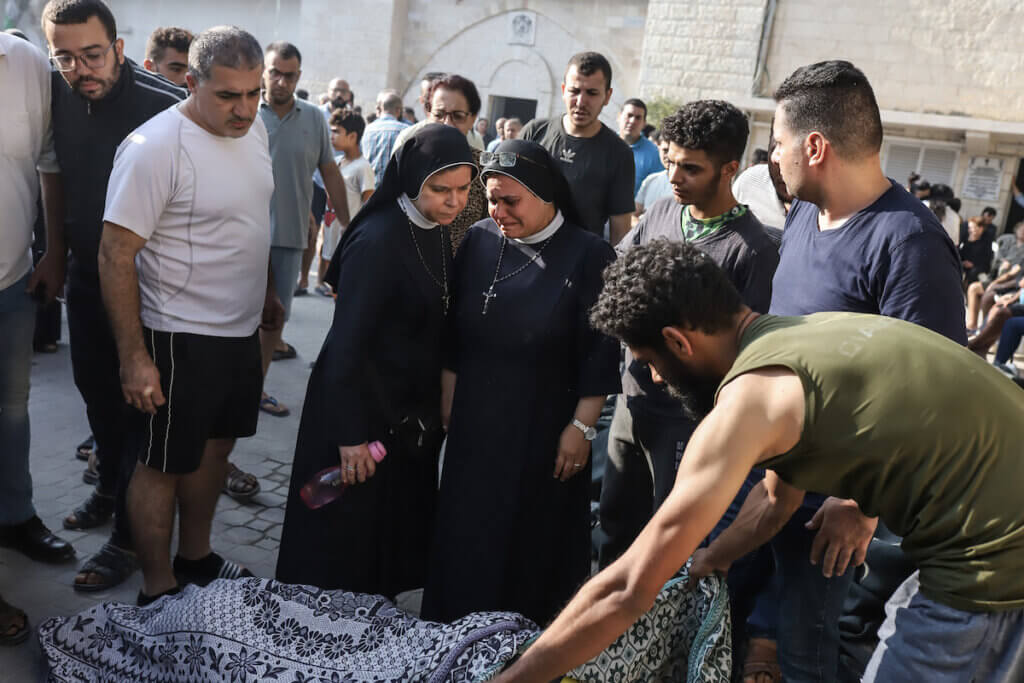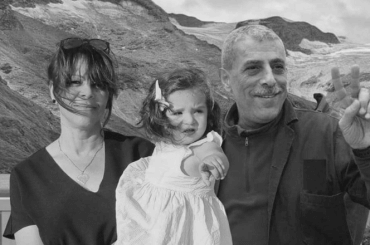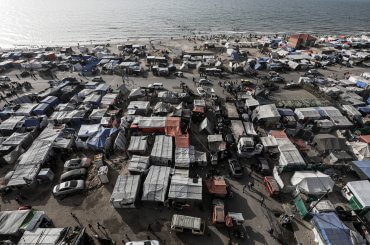On October 19, 2023, the Israeli military bombed the Greek Orthodox Saint Porphyrius Church in Gaza City, the oldest church in Gaza, built in the 12th century. Five hundred Palestinians, of all faiths, had been taking shelter in the church; at least 18 people were killed in the attack. Two weeks later, Israel bombed and destroyed the Orthodox Cultural Center, also in Gaza City.
In December 2023, the Israeli military laid siege to the Holy Family Catholic Church in Gaza City, where about six hundred and fifty Palestinians were seeking refuge; Israeli snipers shot and killed a mother and daughter who were sheltering at the church. Israeli forces have also bombed and damaged the Gaza Baptist Church, Near East Council of Churches, Missionaries of Charity Convent, as well as the Anglican-run Al-Ahli Hospital in Gaza — where close to five hundred Palestinians were killed.
Over four months of bombing, three percent of the approximately one thousand Palestinian Christians living in Gaza have been killed, with many more injured and displaced, leading community leaders to raise concerns about the possible erasure of the entire Palestinian Christian community in Gaza as they plead for support from the global Christian community.
The current Israeli war on Gaza continues a long history of attacks on and elimination of the Palestinian Christian community in Gaza, Jerusalem, and the West Bank. Since 2007, the small but long-standing Christian community in Gaza has declined from three thousand to about one thousand living in the Strip today; in the West Bank and Jerusalem, the larger Palestinian Christian community of about 50,000 has faced a similar decline over the past few decades.
In large part, this population decline has been driven by the stresses of Israeli occupation, apartheid, and siege in Palestine and facilitated by the greater welcome extended by many Western countries to Christian as opposed to Muslim Palestinian emigrants.
However, as Ramzy Baroud points out, the elimination of the Palestinian Christian community is also convenient for Israel, as it “is keen to present the ‘conflict’ in Palestine as a religious one so that it could…brand itself as a beleaguered Jewish state amid a massive Muslim population in the Middle East.”
“The continued existence of Palestinian Christians,” notes Baroud, “does not factor nicely into this Israeli agenda.”
Israeli leaders regularly conflate Palestinian and Muslim identities, placing Palestinian Christians under rhetorical as well as literal erasure. In December 2023, for example, Israeli President Isaac Herzog claimed that Israel’s war on Gaza “is intended…to save Western civilization,” as Israel was being “attacked by a jihadist network,” and “if it weren’t for us, Europe would be next, and the United States follows.” Also in December, the Deputy Mayor of Jerusalem, Fleur Hassan-Nahoum, responded to reports of Israeli sniper attacks on the Holy Family Church in Gaza by claiming there were “no Christians” and “no churches” in Gaza.
Despite their calls for support, the plight of Palestinian Christians has been largely met with notable silence in the West. “Why does the Christian West ignore Palestinian Christians’ plight?” asks Daoud Kuttab, who notes that U.S. President Joe Biden, “a devout Catholic, has said and done nothing to protect fellow Catholics in Gaza.”
Palestinian pastor Munther Isaac, a Lutheran minister in Bethlehem, has condemned Christian silence in the West over the Israeli war on Gaza, saying: “To our European friends, I never, ever want to hear you lecture us on human rights or international law again.”
In October 2023, a group of twelve Palestinian Christian organizations sent a collective letter to western church leaders, stating that “we watch with horror the way many western Christians are offering unwavering support to Israel’s war against the people of Palestine,” and that “we hold western church leaders and theologians who rally behind Israel’s wars accountable for their theological and political complicity in the Israeli crimes against the Palestinians.”
Western silence over the plight of Christians in Palestine is in striking contrast to the outrage expressed just a few years previously to attacks on Christian minority communities in Iraq and Syria. Between 2014 and 2015, the Islamic State of Iraq and Syria (ISIS) launched a campaign of harassment, bombing, displacement, and murder directed at the region’s Christian communities: this included kidnapping and killing Christian clerics, bombing churches and monasteries, and seizing Christian homes and property.
The ISIS attacks on Christians were widely covered at the time by the mainstream media in the West, and reports condemning the attacks were issued by groups from Amnesty International and Human Rights Watch to the Cato Institute and Knights of Columbus. Pope Francis publicly condemned ISIS attacks as a genocide against Christians in 2015, and in 2016, the European Union, US House of Representatives, and UK Parliament followed suit, all condemning the ISIS genocide being committed against Christians in the Middle East.
How can we understand this striking double standard? Turning to Mahmood Mamdani’s 2004 book, Good Muslim, Bad Muslim, can be helpful. In this book, Mamdani notes the distinction broadly drawn in the West between good Muslims, who are “modern, secular, and Westernized,” and bad Muslims, who are “doctrinal, antimodern, and virulent.” In part, by conflating Palestinians with Muslim identity — and Palestinian Muslims with Hamas — Palestinian Christians are erased from view and become treated as part of the overall terrorist threat to Western civilization that bad Muslims represent. The Palestinian Christian effectively becomes rewritten as a bad (terrorist) Muslim: there are “no Christians” in Gaza.
But Mamdani argues that the key distinction between good and bad Muslims lies not in any internal cultural or religious characteristics but rather concerning their position with respect to America and the West. “Judgements of ‘good’ and ‘bad’ refer to … political identities,” writes Mamdani, “not to cultural or religious ones.”
“Simply put,” as Mamdani puts it bluntly in another article on the subject, “a good Muslim [is] a pro-American Muslim and a bad Muslim [is] an anti-American Muslim.”
To extend Mamdani’s argument across faiths, Christians in Iraq and Syria are good Christians who must be defended, not because of any inherent Christian identity or culture, but because they are being attacked by ISIS (bad Muslims), the enemy of America. But Christians in Palestine are not to be defended as they have the misfortune of being attacked by Israel, which happens to be a staunch ally of America. The Palestinian Christian effectively becomes construed as a bad (unmentionable) Christian, the Christian who refuses to act as a minority.
To be a good Muslim or a good Christian in the Middle East, one’s continued existence must be aligned with American, Western, and Israeli geostrategic interests.
“If there are good Muslims and bad Muslims,” writes Mamdani, then we must take note of “the simple but radical suggestion that … there must also be good Westerners and bad Westerners.”
In December 2023, Reverend Munther Isaac, delivering his Christmas sermon at the Evangelical Lutheran Church in Bethlehem, made a “simple but radical suggestion” as he sought to flip the prevailing narrative of good and bad Christians that has governed Western responses to the war in Gaza so far.
“The war has confirmed to us that the world does not see us as equal,” Isaac observed. “Even our kinship in Christ did not shield us…. We are not humans in their eyes.”
“The South African Church taught us the concept of ‘the state theology,’” said Isaac, “defined as the ‘theological justification of the status quo with its racism, capitalism and totalitarianism.”
In the U.S. right now, Isaac pointed out, American Christians “send us bombs while celebrating Christmas in their land,” meaning that many Christians in the West have “made sure the Empire has the theology needed.”
In response, Isaac invoked a different, better version of Christianity.
“If Jesus were to be born today,” Isaac said, “he would be born under the rubble in Gaza.”
“If we, as Christians, are not outraged by this genocide,” he declared, “by the weaponizing of the Bible to justify it, there is something wrong with our Christian witness, and compromising the credibility of the Gospel!”



This is definitely not a religious war. It is between Palestinianism and Israeli Zionism. Palestinians are Muslims, Christians, Jews, atheists and others. We need more of these articles on the plight of Christian Palestinians. We need their voice to be heard and be louder.
While not a religious war, people of faith do go to their church, mosque, or synagogue to help understand events around the world. I’m a Palestinian Christian. I’m also a Mennonite,a type of Protestant from my Mom’s side of the family as she was by far the more religious and spiritual of the two. The articles basic point is that a good Palestinian Christian doesn’t question or goes along with American and Western Imperialism. This is what is expected from most Palestinian Christians, particularly those who don’t go to an ethic church like the Antiochan Orthdodox Church. If there are 100 bad Palestinian Christians, those who support resistance of any kind, they will find the one Good Palestinian Christian, the one who maybe only asks them not to buy any Israeli wine or other such nonsense.
Here is the rub. Mondoweiss has published quite a few articles from this 1% of “Good Christians”. They usually have a relationship with Friends of Sabeel since it’s important to name folks and organs that promote such non violence and appeasement. So this is an example of Mondoweiss not practicing what it preaches. I get it is a Jewish site so the details of happenings in Christian solidarity with Palestine-Israel are not its forte. I also get that even if a church doesn’t buy Golan Heights produced wine, it is far better than Christian Zionism.